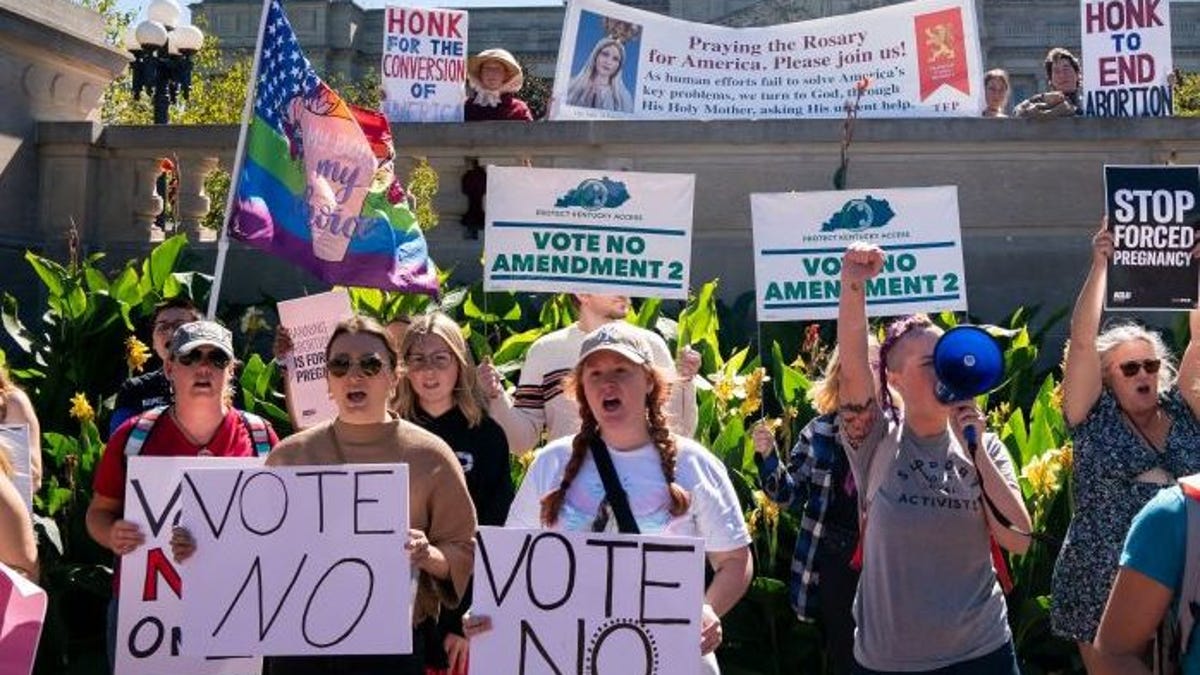Election Day 2022: These 5 States Are Voting on Abortion Rights
The 2022 midterms include the highest number of abortion-related referendums in history.

Demonstrators opposing Kentucky's Amendment 2.
Voters in California, Kentucky, Michigan, Montana and Vermont are all casting ballots today in referendums on abortion access,
That's the highest number of abortion-related initiatives in history, and a clear indication that the landscape for reproductive rights has shifted considerably since June, when the Supreme Court overturned Roe v. Wade, the 1973 decision determining a constitutional right to abortion.
Here's what to know about the five state abortion measures on the ballot, including what they would do, when they could take effect and how likely voters are leaning in each state.
For more on reproductive rights, visit the US Department of Health and Human Services website.
California
A "yes" vote on Proposition 1 would amend California's constitution to read that the state cannot "deny or interfere with" an individual's "fundamental right to choose to have an abortion and their fundamental right to choose or refuse contraceptives."
If it passes, Proposition 1 would go into effect five days after the vote is certified. If the measure fails, abortion will remain protected under current California law. Gov. Gavin Newsom and other Democratic lawmakers endorse the measure.
A September poll from the Public Policy Institute of California showed that 69% of voters support it, while 25% oppose it.
Kentucky
According to a 2019 trigger law, abortion in Kentucky is illegal from the point of fertilization, with an exception if the patient is at risk of dying or of having a "life-sustaining organ" impaired. There is no provision for pregnancies that are the result of rape or incest.
Amendment 2 asks voters to support changing the Kentucky constitution to say that it doesn't "secure or protect a right to abortion or require the funding of abortion."
While the trigger law could be appealed, "the constitutional amendment would not be," University of Louisville political science Professor Dewey Clayton told WHAS-11. "The governor doesn't even have the authority to veto that."
If passed, Amendment 2 would go into effect immediately after the state board of elections certifies the results of the midterm election.
There is no current polling on Amendment 2. A survey this summer by the COVID States Project indicated that 51% of Kentucky residents supported a person's right to an abortion if the pregnancy is the result of rape, while 25% supported the right to an abortion "if a woman doesn't want to be pregnant."
Michigan
Michigan's Proposal 3 would establish an individual's "right to make and effectuate decisions about all matters relating to pregnancy," including choices about contraception, sterilization, infertility, pregnancy, abortion, miscarriage, childbirth and postpartum care.
It would also ban the prosecution of anyone having a legal abortion or assisting in the procedure. It would allow for laws regulating the termination of a pregnancy after the point of fetal viability, except in cases where the patient's physical or mental health was endangered.
A September poll commissioned by the Detroit Free Press found that 64% of respondents supported Proposal 3, compared with 27% who were against it.
Montana
While abortion remains legal in Montana, Legislative Referendum 131 would extend legal personhood to any infant who is "born alive," defined as one "who breathes, has a beating heart or has definite movement of voluntary muscles after the complete expulsion or extraction from the mother."
Failure to provide medical treatment could come with punishments of up to $50,000 and 20 years in prison.
Polling on LR-131 hasn't been reported, but when a bill granting "personhood" to fetuses was proposed in 2011, 56% of Montanans opposed it in a Billings Gazette poll, compared with 35% who supported it.
If it passes, LR-131 would go into effect on Jan. 1.
Vermont
A state constitutional amendment now before voters would enshrine the right to "personal reproductive autonomy," including decisions about pregnancy, contraceptives and abortion.
Should it pass, Proposal 5 would become effective on Election Day, Nov. 8. If it fails, abortion would still be legal in Vermont.
In October, a University of New Hampshire survey found that 75% of respondents supported the measure and 18% said they'd vote against it, while 6% were unsure.
Read more: Marijuana Legalization is on the Ballot in These 5 States

